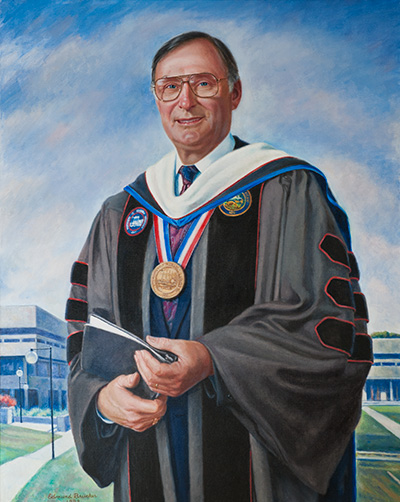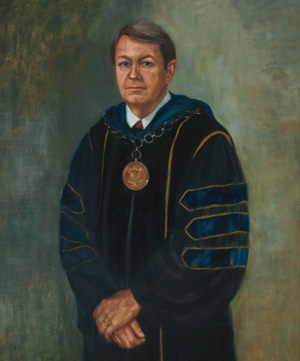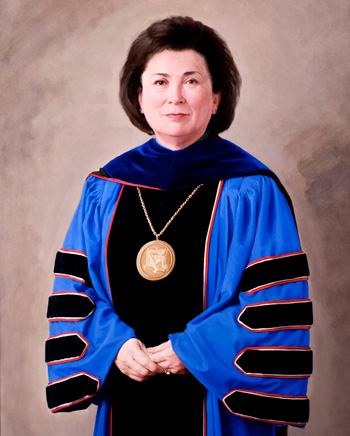Dr. David L. Rice Dr. David L. Rice was the first dean appointed to lead the Evansville campus of Indiana State University in 1967, two years after its opening. In 1971, he was named president of campus and in 1976, Indiana State University also named him a vice president of the main campus. Under his leadership, the Evansville campus evolved into a separate state university, University of Southern Indiana, regarded for its excellent educational programs and innovative regional outreach projects. When he retired in 1994, it was noted that Rice was one of a handful of contemporary University presidents who had led their institution for at least 25 years.
Dr. David L. Rice was the first dean appointed to lead the Evansville campus of Indiana State University in 1967, two years after its opening. In 1971, he was named president of campus and in 1976, Indiana State University also named him a vice president of the main campus. Under his leadership, the Evansville campus evolved into a separate state university, University of Southern Indiana, regarded for its excellent educational programs and innovative regional outreach projects. When he retired in 1994, it was noted that Rice was one of a handful of contemporary University presidents who had led their institution for at least 25 years.
The focus of Dr. Rice’s presidency for 27 years was on serving students well, improving the educational attainment level of southern Indiana, positively impacting economic and workforce development and matching innovative faculty interests with the communities of southern Indiana. During his tenure, enrollment grew to over 7,400 on a master-planned campus with 1,400 acres. Dr. Rice oversaw the expansion of curricula from limited two-year degree programs to a comprehensive range of baccalaureate and master’s degree programs, as well as many cooperative programs with other universities. Under his leadership, USI became the first baccalaureate institution in Indiana to have a degree-transfer articulation agreement with Ivy Tech Community College, paving the way for the State of Indiana to develop a statewide community college system.
Term of Office 1967-1994
Education
Dr. Rice earned his bachelor, master, and doctor of philosophy degrees at Purdue University.
Professional Background
Dr. Rice was a faculty member and served as director of Research at Ball State University, in Muncie, Indiana. He also served as vice president with the Cooperative Education Research Laboratory in Indianapolis and research coordinator in the Bureau of Research in the U.S. Office of Education in Washington, D.C.
He was president of the Board of Commissioners of the Evansville Housing Authority and chairman of the Governor’s Citizens Advisory Committee for Title XX of the Social Services Act. A founder of Leadership Evansville, he also served as its president. Dr. Rice was general chairman of the Fund Drive of the United Way of Southwestern Indiana, chairman of the board of WNIN Channel 9 Public Television, Explorer Chairman of the Buffalo Trace Council Boy Scouts; and president of the Indiana Public Broadcasting Society. He also served on the Board of the Evansville Museum of Arts, History and Science; the Indiana Business Modernization and Technology Corporation; the Chamber of Commerce of Southwest Indiana; The Villages, Inc.; Youth Resources; and Evansville Coalition of Adult Literacy; and was active in Rotary. In professional circles, he served the Indiana Conference for Higher Education as its president, and chaired former Congressman Lee Hamilton’s Southern Indiana Rural Development Project.
Dr. Rice earned many accolades from public service organizations, including the Junior Achievement Distinguished Business Leader Award, Salvation Army Service to Others Award, West Side Civitan Citizen of the Year, the National Community Leadership Conference Leadership Alumni Award, Rotary Civic Award, Boy Scouts Distinguished Citizen Award, and a Sagamore of the Wabash conferred by the Governor of Indiana. In recognition of this University leadership, both the USI Faculty Senate and the USI Alumni Council endowed scholarships in his name. The University Library was named in his honor and both he and Mrs. Rice received honorary doctorates from USI.
Upon retirement from the presidency of USI, he and Mrs. Rice moved to New Harmony, Indiana, where they became active in historic preservation and community restoration. As a volunteer, Dr. Rice led the funding campaign and directed the $2.5 million restoration of the Rapp Owen Granary. It was dedicated in 1999 and is now an important center for historical and cultural events in New Harmony. As a commissioner for the bi-state bridge between New Harmony and Illinois, he was an ardent advocate for state and federal funding to stabilize and re-open the structure.
Dr. H. Ray Hoops Dr. H. Ray Hoops became president in July 1994 and served in that capacity for 15 years until retirement in 2009. As chief executive, he positioned the University of Southern Indiana to be an agent for economic development. From two studies he commissioned on workforce and economic development, the University implemented recommendations and added academic programs in a dozen areas including an undergraduate program in engineering. Four new graduate programs and 11 new academic majors were introduced during the Hoops presidency, and the University’s enrollment increased by 20 percent to 10,126 in fall 2008.
Dr. H. Ray Hoops became president in July 1994 and served in that capacity for 15 years until retirement in 2009. As chief executive, he positioned the University of Southern Indiana to be an agent for economic development. From two studies he commissioned on workforce and economic development, the University implemented recommendations and added academic programs in a dozen areas including an undergraduate program in engineering. Four new graduate programs and 11 new academic majors were introduced during the Hoops presidency, and the University’s enrollment increased by 20 percent to 10,126 in fall 2008.
During his years as president, the University of Southern Indiana expanded to include the Liberal Arts Center, the Recreation, Fitness and Wellness Center, the Education Center and Torrington Wing of the Science Center, David L. Rice Library, and the start of construction of the Business and Engineering Center and a second expansion of the University Center, plus four residence halls.
Dr. Hoops started an initiative for employees, faculty and students to make important contributions through volunteerism. Volunteer USI records more than 32,000 volunteer hours annually.
Dr. Hoops led the University through its first capital campaign, Campaign USI, in 1997. The successful campaign exceeded its goal, raising a total of $18 million in gifts and pledges and $6 million in deferred gifts. During Dr. Hoops’ presidency, the assets of the USI Foundation reached $70 million.
Term of Office 1994 – 2009
Education
Dr. Hoops received his undergraduate degree from Eastern Illinois University. His master's and doctoral degrees in audiology and speech sciences are from Purdue University. He also completed an M.B.A. at Moorhead State University.
Professional Background
Before arriving at USI, Dr. Hoops served as the vice chancellor for Academic Affairs at the University of Mississippi, associate vice chancellor for Academic Affairs in the Oregon State System of Higher Education, president of South Dakota State University, vice president for Academic Affairs at North Dakota State University, dean of the Graduate College at the University of Northern Iowa, and associate director of the Office of Grants and Contracts Administration and Professor of Communicative Disorders at Wayne State University.
While at the University of Mississippi, Dr. Hoops gained national recognition for his work as chair of Project ’95, a blueprint for education in the State of Mississippi for the 1990s. Highlights of his administrative achievements include improving cultural and racial diversity at the University of Mississippi, resulting in the University’s receiving the Peterson’s Guide Award; significantly upgrading the financial standing of South Dakota State University; implementing a program to encourage faculty development at North Dakota State University for which the University came to be recognized as a leader; guiding the transition of the University of Northern Iowa from a traditional undergraduate institution to one with doctoral offerings and developing institutional systems largely responsible for doubling outside grant support.
Dr. Linda L. M. Bennett Dr. Linda L. M. Bennett became president in July 2009, after serving as provost and vice president for Academic Affairs since 2003. Since coming to the University of Southern Indiana, Dr. Bennett has led initiatives focused on enrollment and retention management, outreach and engagement, faculty development, the retention of intellectual capital, accreditation renewal, and long-range planning. She coordinated the self-study, which led to the approval of USI’s first doctoral program — Doctor of Nursing Practice — by the Higher Learning Commission.
Dr. Linda L. M. Bennett became president in July 2009, after serving as provost and vice president for Academic Affairs since 2003. Since coming to the University of Southern Indiana, Dr. Bennett has led initiatives focused on enrollment and retention management, outreach and engagement, faculty development, the retention of intellectual capital, accreditation renewal, and long-range planning. She coordinated the self-study, which led to the approval of USI’s first doctoral program — Doctor of Nursing Practice — by the Higher Learning Commission.
In addition to serving as president, she is a professor of political science and has taught courses in Introduction to American Politics for USI students. Dr. Bennett has more than 25 years’ experience in teaching, USI’s primary focus, and throughout her career as an administrator has recognized the importance of an outstanding faculty to a teaching institution with initiatives to enhance faculty recruitment and retention, scholarship, and engagement. Her scholarship focuses on public opinion about American politics and political institutions, as well as issues in higher education administration.
In her first year as president, she led the effort to establish the University's first strategic plan. This plan includes an intentional effort to raise the University’s academic standards, admitting students most likely to succeed at a four-year university. “Our incoming freshmen average GPA is higher than it has been in our nearly 50-year history,” said Dr. Linda L. M. Bennett, president. “Additionally, over the past two years, the size of our graduating class has increased by 18 percent.” In the Fall 2014 semester, USI launched new core requirements and two new tracks for adult learners in its Bachelor of General Studies program. Also under Dr. Bennett’s leadership, enhanced admission processes are being implemented and the University’s brand and image are being promoted across the region.
Currently, Dr. Bennett is leading Campaign USI: Elevating Excellence, a $50 million capital campaign announced in 2013, which will culminate at the end of the University’s 50th Anniversary in December, 2015.
Term of Office 2009 - current
Education
Dr. Bennett received her bachelor’s, master’s, and doctoral degrees in political science from the University of Cincinnati.
Professional Background
Dr. Bennett's experience in higher education includes service at three other universities. From 1996-1999, she was chair of the Department of Political Science and professor of political science at Northern Kentucky University. From 1983-1996, she was associated with Wittenberg University. She chaired the Department of Political Science from 1994-1996 and rose to the rank of professor in 1996.
Dr. Bennett came to USI from Appalachian State University in Boone, North Carolina, where she served from 1999-2003 as dean of the College of Arts and Sciences and professor of political science. At Appalachian State, she established a college-wide Diversity Committee to develop strategies for faculty recruitment and retention. She also led the College of Arts and Sciences Advancement Council in statewide friend-and fund-raising efforts, including a capital campaign that raised more than $5 million.